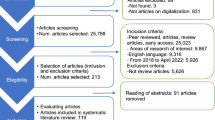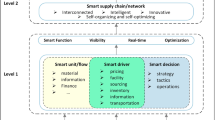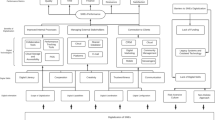Abstract
To respond to increased competition, manufacturing organisations have started developing digital ecosystems within a supply chain by adopting Industry 4.0 technologies. That approach promises to improve organisational efficiency by automating operations and decision-making activities. The development of the digital ecosystem passes through vertical and horizontal integrations of technologies. Vertical integration represents the integration of various organisational units, and it is a milestone in the process of reaching horizontal integration where different organisations integrate their production processes in a supply chain. The extant literature reveals that the vertical integration of an organisation is challenging to achieve, as the adoption process of Industry 4.0 employs a technocentric perspective without considering the way that technology users can cause strong workforce resistance against Industry 4.0 adoption. The sociotechnical perspective addresses this issue by considering both technology and users during the adoption process. Therefore, this paper illustrates the applicability of the sociotechnical approach to an in-depth single case study of an Italian manufacturing group which successfully adopted Industry 4.0 technologies. We show the adoption process of Industry 4.0 technologies, highlighting the outcome of the adoption and proposing sociotechnical enabling factors that assist in achieving vertical integration.



Similar content being viewed by others
Data availability
The data that support the findings of this study are available from the corresponding author on request.
Notes
AIDA is an online database, owned by Bureau van Dijk, containing financial information of more than 500,000 Italian companies. AIDA has official balance reports of Italian companies of the last 10 years.
References
Alter S (2013) Work system theory: overview of core concepts, extensions, and challenges for the future. J Assoc Inf Syst 14(2):72–121
Alter S (2014) Theory of workarounds. Commun Assoc Inf Syst. https://doi.org/10.17705/1CAIS.03455
Blunck E, Werthmann H (2017) Industry 4.0—an opportunity to realize sustainable manufacturing and its potential for a circular economy. DIEM Dubrov Int Econ Meet 3(1):644–666
Bonekamp L, Sure M (2015) Consequences of Industry 4.0 on human labour and work organisation. J Bus Media Psychol 6(1):33–40
Bostrom RP, Heinen SJ (1977) MIS problems and failures: a socio-technical perspective. Part I: the causes. MIS Quart 1(3):17
Braccini AM, Margherita E (2019) Exploring organizational sustainability of Industry 4.0 under the triple bottom line: the case of a manufacturing company. Sustainability 11(1):36. https://doi.org/10.3390/su11010036
Corbin JM, Strauss AL (2015) Basics of qualitative research. Techniques and procedures for developing grounded theory. SAGE Publications Inc., Thousand Oaks, California
Dantas de Sena Junior LC, Alves da Silva RE, Mendonça Torres L, Gomes de Sousa Y, de Medeiros SM, Bittencourt Leite de Carvalho J (2016) Knowledge workers on occupational hazards in the industry of ceramics. Int Arch Med. https://doi.org/10.3823/2008
de Sousa Jabbour ABL, Jabbour CJC, Foropon C, Filho MG (2018) When titans meet—can industry 4.0 revolutionise the environmentally-sustainable manufacturing wave? The role of critical success factors. Technol Forecast Soc Change 132:18–25. https://doi.org/10.1016/j.techfore.2018.01.017
Denzin N (2006) Sociological methods: a sourcebook (A. Transaction, ed), 5th edn. Aldine Transaction
DeSanctis G, Poole MS (1994) Capturing the complexity in advanced technology use: adaptive structuration theory. Organ Sci 5(2):121–147
Evans PC, Annunziata M (2012) Industrial internet: pushing the boundaries of minds and machines. General Electric Reports
Goodhue DL, Thompson RL (1995) Task-technology fit and individual performance. MIS Q 19(2):213–236
Kagermann H, Wolfgang W, Helbig J (2013) Recommendations for implementing the strategic initiative INDUSTRIE 4.0. Working Group. Acatech, Frankfurt Am Main, p 82. https://doi.org/10.13140/RG.2.1.1205.8966
Kamble SS, Gunasekaran A, Sharma R (2018) Analysis of the driving and dependence power of barriers to adopt industry 4.0 in Indian manufacturing industry. Comput Ind 101:107–119. https://doi.org/10.1016/j.compind.2018.06.004
Kang HS, Lee JY, Choi S, Kim H, Park JH, Son JY, Noh SD et al (2016) Smart manufacturing: past research, present findings, and future directions. Int J Precis Eng Manuf Green Technol 3(1):111–128. https://doi.org/10.1007/s40684-016-0015-5
Kumar N, Stern LW, Anderson JC, Stern LW, Anderson JC (1993) Conducting interorganizational research using key informants. Acad Manag J 36(6):1633–1651
Land F (2000) Evaluation in a socio-technical context. In: Basskerville R, Stage J, DeGross JI (eds) Organizational and social perspectives on information technology. Kluwer Academic Publishers, Boston
Langley A (1999) Strategies for theorizing from process data. Acad Manag 24(4):691
Leavitt HJ (1964) Applied organization change in industry: Structural, technical and human approaches. New perspectives in organisational research. Wiley
Lee J, Bagheri B, Kao HA (2015) A cyber-physical systems architecture for Industry 4.0-based manufacturing systems. Manuf Lett 3:18–23
Leonardi PM (2012) Materiality, sociomateriality, and socio-technical systems: what do these terms mean? How are they different? Do we need them? In: Leonardi PM, Nardi BA (eds) Materiality and organizing: social interaction in a technological world. Oxford Press, Oxford
Liao Y, Deschamps F, Loures EDFR, Ramos LFP (2017) Past, present and future of Industry 4.0—a systematic literature review and research agenda proposal. Int J Prod Res 55(12):3609–3629
Locke KD (2001) Grounded theory in management research. SAGE Publications, London
Lyytinen K, Newman M (2008) Explaining information systems change: a punctuated socio-technical change model. Eur J Inf Syst 17(6):589–613
Margherita EG, Braccini AM (2020a) Exploring the socio-technical interplay of Industry 4.0: a single case study of an Italian manufacturing organisation. In: Proceedings of the 6th international workshop on socio-technical perspective in IS development (STPIS 2020), June 8–9, 2020. CEUR Workshop Proceedings (CEUR-WS.org)
Margherita EG, Braccini AM (2020b) Industry 4.0 technologies in flexible manufacturing for sustainable organizational value: reflections from a multiple case study of Italian manufacturers. Inf Syst Front. https://doi.org/10.1007/s10796-020-10047-y
Margherita EG, Braccini AM (2020c) Organizational impacts on sustainability of Industry 4.0: a systematic literature review from empirical case studies. In: Agrifoglio R, Lamboglia R, Mancini D, Ricciardi F (eds) Digital business transformation organizing, managing and controlling in the information age. Springer, pp 173–186. https://doi.org/10.1007/978-3-030-47355-6_12
Margherita EG, Braccini AM (2021) Managing the fourth industrial revolution: a competence framework for smart factory. In: Hamdan A, Hassanien AE, Razzaque A, Alareeni B (eds) The fourth industrial revolution: implementation of artificial intelligence for growing business success. Studies in computational intelligence. Springer. https://doi.org/10.1007/978-3-030-62796-6_23
Margherita EG, Bua I (2021) The role of human resource practices for the development of Operator 4.0 in Industry 4.0 organisations: a literature review and a research agenda. Businesses 1(1):18–33. https://doi.org/10.3390/businesses1010002
Müller JM (2019) Assessing the barriers to Industry 4.0 implementation from a workers’ perspective. IFAC-PapersOnLine 52(13):2189–2194. https://doi.org/10.1016/j.ifacol.2019.11.530
Müller JM, Buliga O, Voigt KI (2018) Fortune favors the prepared: How SMEs approach business model innovations in Industry 4.0. Technol Forecast Soc Change 132:2–17
Mumford E (2003) Redesigning Human Systems. IGI Global
Prause G, Atari S, Prause G, Atari S (2017) On sustainable production networks for Industry 4.0. Entrep Sustain Issues Entrep Sustain Center 4(4):421–431
Ruggieri A, Braccini AM, Poponi S, Mosconi EM (2016) A meta-model of inter-organisational cooperation for the transition to a circular economy. Sustainability 8(11):1153. https://doi.org/10.3390/su8111153
Sarker S, Chetterjee S, Xiao X (2013) How “Sociotechnical” is our is research? An assessment and possible ways forward. In: Baskerville R, Chau M (eds) Proceedings of the 34th international conference on information systems. ICIS 2013, pp 1–24
Sarker S, Chatterjee S, Xiao X, Elbanna A (2019) The sociotechnical axis of cohesion for IS discipline: its historical legacy and its continued relevance. MIS Q 43(3):695–719
Sawyer S, Jarrahi MH (2014) Sociotechnical approaches to the study of information systems. In: Tucker A, Topi H (eds) Computing handbook: information systems and information technology, 3rd edn. Taylor & Francis, Boca Raton
Sayar D, Er Ö (2018) The antecedents of successful IoT service and system design: cases from the manufacturing industry. Int J Des 12(1):67–78
Sony M, Naik S (2019a) Critical factors for the successful implementation of Industry 4.0: a review and future research direction. Prod Plan Control. https://doi.org/10.1080/09537287.2019.1691278
Sony M, Naik S (2019b) Key ingredients for evaluating Industry 4.0 readiness for organizations: a literature review. Benchmarking. https://doi.org/10.1108/BIJ-09-2018-0284
Sony M, Naik S (2020) Industry 4.0 integration with socio-technical systems theory: a systematic review and proposed theoretical model. Technol Soc 61:101248. https://doi.org/10.1016/j.techsoc.2020.101248
Stock T, Seliger G (2016) Opportunities of sustainable manufacturing in Industry 4.0. Procedia CIRP 40:536–541. https://doi.org/10.1016/j.procir.2016.01.129
Trist E (1981) The sociotechnical perspective: the evolution of sociotechnical systems as a conceptual framework and as an action research program. Perspectives on organizational design and behavior. Wiley, New York
Von Bertalanffy L (1972) The history and status of general systems theory. Acad Manag J 15(4):407–426
Walsham G (2006) Doing interpretive research. Eur J Inf Syst 15(3):320–330. https://doi.org/10.1057/palgrave.ejis.3000589
Yin RK (2002) Case study research: design and methods, vol 5. SAGE Publications, Thousand Oaks
Author information
Authors and Affiliations
Corresponding author
Ethics declarations
Conflict of interest
On behalf of all authors, the corresponding author states that there is no conflict of interest.
Rights and permissions
About this article
Cite this article
Margherita, E.G., Braccini, A.M. Examining the development of a digital ecosystem in an Industry 4.0 context: a sociotechnical perspective. SN Bus Econ 1, 89 (2021). https://doi.org/10.1007/s43546-021-00096-z
Received:
Accepted:
Published:
DOI: https://doi.org/10.1007/s43546-021-00096-z




